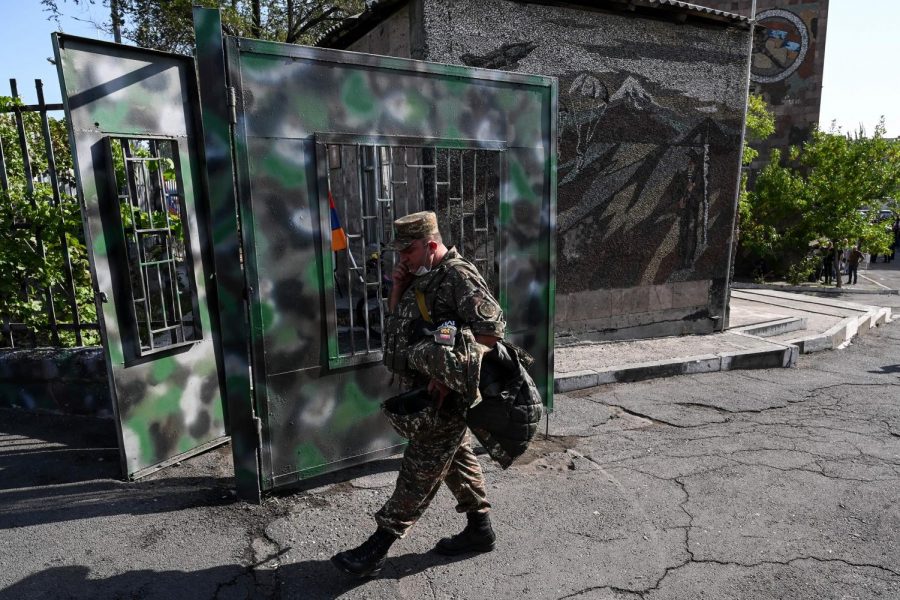OPINION: Governments have too much power
A man wearing a military uniform walks in front of a military commissariat in Yerevan on Spet. 30, 2020. Armenian Prime Minister Nikol Pashinyan on Wednesday said peace talks with Azerbaijan under Russian mediation would be inappropriate, as fighting over the breakaway Nagorny Karabakh region entered a fourth day. (AFP/Getty Images/TNS)
Global tensions are soaring. Alliances are fraying. Superpowers are slapping each other with sanctions and sky-high tariffs. Terrorism remains a serious threat. Critical resources like oil are being fought over. Conflicts in the Middle East have yet to cease, with no end in sight. Climate change continues to wreak havoc on an already disaster-weary planet. Furthermore, as if things could not get any worse, a global pandemic has killed more than a million people and inflicted massive and ongoing social and economic disruptions, threatening to further inflame an already unstable global society.
Almost all of these issues share a commonality: powerful governments are involved. They either directly cause problems or refuse to address them appropriately. This trend is especially pronounced whenever an unchecked government, especially an authoritarian one, abuses its power and violates the rights of its civilians to push its personal agendas. However, it is also important to note that governments do not misbehave all the time; for instance, nearly all developed countries have joined international cooperation agreements. When the US invaded Iraq in 2003, it was able to oust tyrant Saddam Hussein and restore free elections to civilians. However, if a government oversteps its boundaries and gets too involved in civilian and foreign affairs, problems arise.
Perhaps the most striking example of this is the ever-increasing tensions between the United States and China. Both countries have been and are continuing to act foolish with one another by fighting a costly trade war. The severe tariffs and sanctions being mutually imposed inflicted harm to both economies, which included rises in prices, increased economic uncertainty, and even concerns of the conflict escalating further. Keep in mind this information was from November 2019, before the pandemic.
Nearly a year later, we have seen the lattermost ramification in action. In addition to an intense blame game over COVID-19, the two powers have been fighting a technology war. China has a “national intelligence” law that requires companies based in the country, such as ByteDance and Huawei, to reveal data to the government upon request. Consequently, the Trump administration has been pursuing a ban of the app TikTok for national security reasons. Despite numerous legal battles, internet traffic associated with TikTok remains slated to be banned Nov. 12 unless an American company can foot the massive costs of buying out the app’s U.S. operations. WeChat, a popular Chinese texting app, would also be included if the ban is allowed to take effect.
This huge mess we call U.S.-China relations is the product of blatant government overreach and intrusion into civilians’ lives. The intense rivalry has produced no winners. Many Americans disapprove of the drama. Additionally, Chinese-American families who rely on WeChat to stay connected are at risk of being torn apart, an especially serious worry given that nearly 5 million Americans are of Chinese descent. Trump’s “national security” concerns over TikTok and WeChat are questionable because there is no hard evidence at this time of American civilians being directly harmed by China for using TikTok. Even if there were documented incidents, U.S. authorities are far more likely to use Americans’ data against them than Chinese authorities.
Sadly, the U.S. and China are not the only governments to fall out of line. In other parts of the world, the practice of governments putting their own interests ahead of their citizenry has turned deadly. Armed conflict has played significant roles in human history and helped lay the foundations for our modern global society, but wars are still raging across parts of the globe. The Middle East has been the main theater of modern-day fighting, where most nations are impoverished and authoritarian. Most regimes in that region are not accepting of religious freedom, women’s rights, or LGBTQ interests. Clearly, tyranny is linked to war, which is another powerful reason for governments to be kept in check and prevented from overstepping their boundaries.
Most recently, fighting between longtime rivals Armenia and Azerbaijan has erupted this week over the disputed Nagorno-Karabakh territory. Military deaths from both sides totaled more than 200, a number that is expected to rise further. Several civilians on both sides have also been killed, including five members of the same Azerbaijani family. Hundreds more are in the hospital. The territory of interest technically belongs to Azerbaijan, but many of its residents identify as Armenian. It has been contested ever since the Soviet Union, which both factions belonged to, dissolved in the early 1990s.
With the exception of pro-Azerbaijan Turkey, all developed nations have condemned the fighting and called for an immediate return to ceasefire. While it remains unknown at this time who fired the first shots, both regimes are acting on their own agendas and not considering the welfare of the civilians. The nations are now in violation of international law due to the civilian casualties. This mayhem is another severe case of lives being lost at the hands of selfish, abusive governments. Surprisingly, there isn’t even any evidence that those civilians in that region were able to vote for or against all this!
Unfortunately, the ramifications of the countries’ foul play are not just limited to the disputed territory. The entire populations of both countries are now living under martial law. Mobilizations of reserve troops are underway in both, and Nagorno-Karabakh has summoned all of its men to the battlefield. While the rules for civilians are unclear, it’s clear that they are losing tremendous amounts of freedom and autonomy. In Azerbaijan, for instance, it is known that a 9 p.m. curfew is being enforced nationwide. Meanwhile, just like it’s the focus of the fighting, the disputed territory is the epicenter of freedom lost, as men are being legally forced into war whether they support it or not. The only real solution to this chaos is for both regimes to leave the territory alone for now and then give its residents a true say, a vote, in what should happen. This is the libertarian solution. The same solution can be adopted for most of the other intra- and inter-state conflicts and tensions plaguing the world today.












